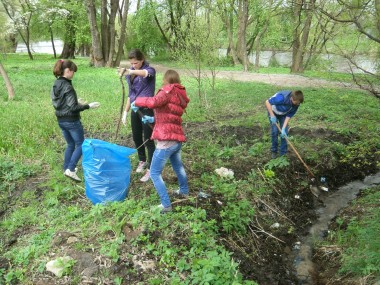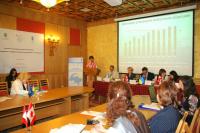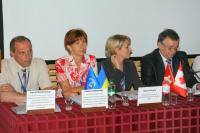Ivano-Frankivsk, May 27-28: To solve numerous problems in the area of the solid waste management, experts, government officials, public organisations and representatives of over 25 city councils of Ukraine offered the Government a number of practical recommendations at the round table, organised by UNDP Project "Municipal Governance and Sustainable Development Programme" with financial support from Swiss Confederation. Having studied the experience of Ivano-Frankivsk, Kalush (Ivano-Frankivsk Region), Voznesensk (Mykolaiv Region), Korosten, Novograd-Volynskyy (Zhytomyr Region) and other municipalities, around 60 participants of the round table presented their proposalsto the Government to develop effective national strategy for Solid Waste Management.
Substandard utilisation of solid waste products leads to environmental pollution and affects the health of urban residents. Therefore, more and more countries are changing their strategy of solid waste management to reduce the number of waste products, and introduce modern environmentally friendly technologies of recycling. According to the experts, such a policy can reduce the waste products sent to landfill by 40%.
Over 50 million cubic meters of waste products are generated in Ukraine annually. Among them only 3% are recycled. The rest is placed on landfills which do not meet environmental requirements. Over the past ten years, the volume of household waste products per a person, on average, increased by 40%. Due to lack of adequate system for solid waste products collection in the private sector, about 3300 unauthorized dumps appear annually.
National Programme on Solid Waste Management was approved by Government in 2004. The purpose was to create conditions that will ensure the full collection, transportation, recycling, disposal and dumping of waste products and limit their harmful impact on the environment and human health. For today, this program is outdated and unable to solve problems in this area. Required changes to this Program should include the separate collection of solid waste products and public support for modern environmentally friendly technologies of their processing and utilisation, effective tools for monitoring the violations in this area, to develop and take actions to improve public environmental awareness.
According to Ukrainian legislation, local self-government bodies should provide collection and disposal of solid waste products as well as organise separate collection of useful components. There is a need in the change of existing practices in area of SWM, but only few municipalities have been applying innovative tools of collection and utilisation of solid waste products.
Therefore, UNDP Project "Municipal Governance and Sustainable Development Programme" organised a round table to determine needs and opportunities to solve problems in the area of Solid Waste Management (SWM) with the participation of mayors and their representatives from 25 municipalities, Ukrainian and international experts, representatives of international organisations. The main task of the round table is to identify the problems and defects of existing legislation and to share best practices. In addition, it aims to develop recommendations for the Government to change legislation that regulates the SWM area. It is also important to promote mechanisms for intermunicipal cooperation to solve problems in the area of SWM and propose ways to improve the SWM in the cities."
Olena Lytvynenko, Programme Coordinator of Swiss Cooperation Office said that solid waste management is a priority area of support to Ukraine. Olena Lytvynenko mentioned that in Switzerland 80% of solid wastes are sorted. This country is one of the world leaders in solid waste management.
Opening the round table, Bogdan Bilyk, the Head of the Economic Development and Integration Department of the Executive Committee of Ivano-Frankivsk City Council, Chairman of the National Forum of UNDP partner municipalities, said: "The role of community in the reforming the approach to SWM is very large. The community must choose technologies, set tariffs and control the quality of services deliveredto population.” The system of separate garbage collection, sorting and processing of solid waste products is introduced in Ivano-Frankivsk. In addition, the sorting line KIS-10 has been established, which will sort and partly recycle 50 thousand tons of solid waste products per year in Ivano-Frankivsk. Participants of the round table visited the plant with the sorting line, the territory of separation and collection of waste products and the Administrative Services Center in Ivano-Frankivsk.
Irina Hudz, the Director of the Municipal Support Unit of Novograd-Volynskyy City Council told the participants about the experience of the garbage removal from the private sector. She said that "small and medium municipalities face the primary challenge to organise collection and removal the garbage, which often does not require significant funding. Itis all about hard work of the local government officials to motivate and raisepeople’s awareness aboutthe environmentally friendly living conditions in the city.”
Andre Olschewski, the expert of Skat (Switzerland) / project "Support to Decentralisation in Ukraine” implemented with support from Swiss Confederation told about the effective models of the SWM, namely, intermunicipal cooperation that is highly developed in the West. He marked poor formal coordination among municipalities in the SWM area in Ukraine. The expert recommended the model of inter-municipal cooperation to eliminate negative impact of wastes, to prevent illegal dumps and set up the whole functional system.
The other participants included Lyudmyla Doroshuk, the Deputy Director of Public Welfare and Housing Services Department, the Head of Public Services of the Ministry of Housing and Municipal Economy of Ukraine; Sergiy Omelyanets, the Chief Consultant of the Comittee of Verkhovna Rada of Ukraine on ecological policy, environmental management and consequences of the Chernobyl disaster; Yuriy Herzhov, the Mayor of Voznesensk; Oksana Remiga, UNDP Senior Programme Manager; Iryna Skaliy, UNDP/MGSDP Project Manager, city mayors and their authorized representatives from 25 local self-government bodies.
Recommendations, made by participants during the round table, will be handed over to the Ministry of Housing and Municipal Economy and Committee of Verkhovna Rada of Ukraine on ecological policy, environmental management and elimination of consequences of Chernobyl disaster
For more details, please, contact www.msdp.undp.org.ua, Galyna Smirnova, Monitoring and Communications Officer of UNDP/MGSDP, by tel. (044) 253 5068 or via e-mail: galyna.smirnova at undp.org.ua



















